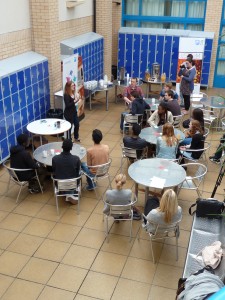How to organise a research café
By Ann Grand and Ellie Dommett
Academic research isn’t just for wild-haired geeks in white coats, we all know that at some level – it’s hard to imagine living our lives without the contributions of research but many people never have routine opportunities to engage face-to-face with practising researchers.
Combined with a flexible and adaptable structure that allows participants to organise events and engage directly with working researchers in ways that make sense to them, research cafés (which are modeled on the methodologies developed through the café scientifique movement) can provide just such a forum for informal engagement with research.

A research café at Denbigh School, Milton Keynes, discussing ‘Smart drugs: a right or a responsibility’. Photo: Richard Holliman.
What is a research café?
A research café (café scientifique, ‘science café’, ‘café sci’, ‘science lounge’ – call it what you will) is an event, where, for the price of a drink and a biscuit, anyone can come to explore and engage with some of the latest ideas and issues related to academic research.
Research cafés are ideal for a school environment, connecting pupils in meaningful ways with issues that they care about, discussed directly on their terms with academic researchers.
They can be organised during lessons, over lunch or after school, e.g. through a school club. Audience numbers range from ten to 30, an ideal class size. Teachers don’t have to be scientists or ‘badged-up’ experts – all they need is an enquiring and open mind, a group of enthusiastic students, and a desire to engage with the topic under discussion.
To read on, select: How to organise a research café.
Alternatively, you could watch the following video.

